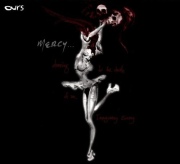 With the temperature dropping, it's time to find someone to keep you warm. Find your hookups with our online dating guide!
With the temperature dropping, it's time to find someone to keep you warm. Find your hookups with our online dating guide!
Mercy (Dancing for the Death of an Imaginary Enemy)
- Alternative Rock
- 2008
- Buy the CD
Reviewed by Taylor Long
()
OURS show guts from the very beginning of Mercy, using the album’s longest song as its opener and title track. It feels like their artist’s statement, a six-minute, 41-second case study of the band’s aesthetics and the album’s direction. A big change from the recent direction of heavier alternative rock is that OURS don’t feel the need to force their songs into neat little packages. If a song needs to wander a bit, they let it wander. Every song on Mercy is over 4-minutes long, which seems like nearly double the length of modern rock’s ADD-catering radio singles. The result is that every song sounds like a complete thought, its own entity, its own island in an archipelago.

Unlike a lot of their contemporaries, OURS don’t limit themselves to a constant barrage of speed and sound. Too many heavy alternative groups seem to counter any display of vulnerability or emotion with attempts to shred ear drums, as if trying to compensate for a potential loss of manliness. Songs like “Ran Away to Tell the World,” with its gorgeous cello part and “God Only Wants You,” comprised of just acoustic guitar and front-man Jimmy Gnecco’s much talked about voice, are perfect examples of what separates OURS from those afraid to let their guard down, even a little.
Gnecco’s stellar voice is indeed still the focal point of OURS, though to a lesser extent than before. Where in the past it occasionally seemed like it was too easy to just let his voice carry the weight, here the songs are so well developed that they seem to give his vocals a little more freedom. He doesn’t unnecessarily push himself – where others might sound strained, he sounds natural.
The biggest downside of Mercy is the lyrics, which have a tendency to be a little boring, trite, and/or repetitive. The messages are strong, which makes it even more frustrating that they aren’t shared in more interesting ways. Still, they do mesh with the music well, so at the very least, when the lyrics are at their worst, they’re easy to ignore – with the exception of the spoken-word interlude during “Black,” which is the only downright awful moment in the album. They also bury some of their more accessible, possible singles, like “Saint” and “Willing,” in the last quarter of the album, which, in addition to “The Worst Things Beautiful,” are Mercy’s poppiest tracks. They would have served new listeners well with higher placement.
At times, all of this musical reminiscing forces the question – is there really a place for a band like OURS at a time when rap and R&B still reign supreme, and rock is turning more and more of its future onto either hyperactive pop-rock like Fall Out Boy or Panic! At The Disco, or the latest indie pop blog sensation? The answer is a murky one, because even though it would be a stretch to call OURS groundbreaking in the context of history, at times like these an album like Mercy is a breath of fresh air.
You can follow us on Twitter and Facebook for content updates. Also, sign up for our email list for weekly updates and check us out on Google+ as well.











